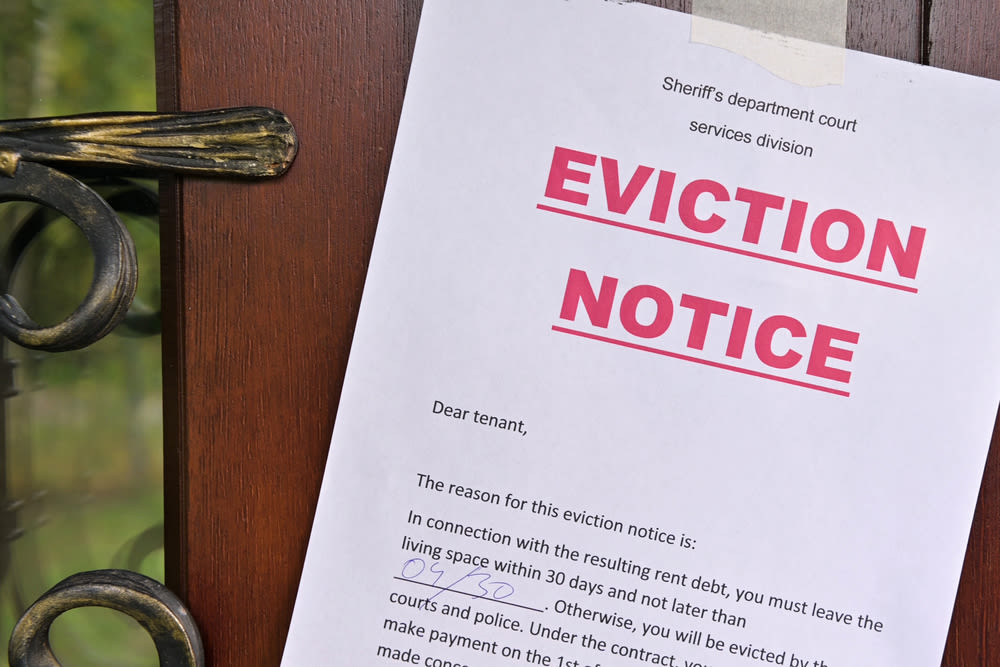Q&A with Portland Tenants United: What’s With the Delay in Rental Assistance Funding?

Thousands of Oregonians are facing eviction, even though the state has millions in rental assistance funds that have yet to be distributed.
Image: Slava Dumchev/Shutterstock
Oregon currently has $204 million in state and federal funding to spend on rental assistance for those hit hardest by the pandemic. At the same time, 30,000 Oregonians are facing immediate eviction. So what’s keeping tenants from getting the financial help they need to keep a roof over their heads?
The state’s eviction moratorium for renters ended on July 1, and landlords have quickly come to collect. Renters who applied for assistance had a 60-day grace period (90 days if they were in Multnomah County) before eviction, but that time came and went and for many, the rental assistance didn’t arrive.
Like Oregon’s unemployment assistance program back in March 2020, the Oregon Emergency Rental Assistance Program has been slow to get on its feet. Today, 43 percent of applications statewide and 49 percent of those in Multnomah County are still waiting to be reviewed. A tide of lawmakers, organizations, and activists are urging Governor Kate Brown to call a special session like last year to once again reinstate the eviction moratorium.
Until then, thousands of Oregonians are relying on the slow and often complicated process of applying for rental assistance. After adding 26 new staff members in August, OERAP has gained some momentum. Over $100 million of the program’s budget has been paid out to landlords. Still, more and more eviction notices come pouring in while the state figures out what to do next.
To learn more about the state of rental assistance in Oregon, we sat down with Alli Sayre, an organizing coordinator for Portland Tenants United.
Portland Monthly: How effective has the program been in keeping people in their homes so far?
Sayre: I think it's been pretty effective. A lot of folks have applied, over I think 46,000 applications and 15,000 have been paid. Those folks are protected from non-paying eviction. There's two channels of how money is getting dispersed. There's a statewide channel through the Oregon Emergency Rental Assistance application. And then there's also community-based organizations.
The community-based organizations, for the most part, are doing a really good job of getting money out quickly. But the state application is doing a really bad job of getting money out and basically had gotten no money out until a few weeks ago. Thousands who have applied for assistance are past the 60-day safe harbor, but they haven't received their rent assistance.
For big landlords there’s not a very strong incentive to not just evict tenants, especially if they don't have very much rent debt. It might make more financial sense for the landlord to just evict them and try to get another tenant.
Portland Monthly: On the ground, what is happening to renters who have applied but haven’t received any assistance yet?
Sayre: There are two things happening to tenants whose applications haven't been processed.
One is that some of them were already facing eviction. Some of them had their eviction cases dismissed, but some of them just had their eviction cases delayed for 90 days in Multnomah County.
Additionally, tenants are facing a lot of landlord harassment behaviors. For example, insisting on coming in and inspecting the apartments or the rental units, making a lot of noise outside, just really trying to make renters uncomfortable, contacting them a lot, asking them what's going on about the rent assistance. Some landlords are really refusing to even help with the process. The goal is to try to get the tenant to self-evict, to get the tenant to just move out so that the landlord can re-rent the unit without even having to file an eviction.
Or landlords are trying to come up with other reasons to evict them that's not for non-payment. I've heard of several lease violation notices for harassment of their neighbors that are just completely made up. We as an organization have directly heard from tenants who have received bad faith, no cause evictions.
In the state of Oregon, we have some level of just cause eviction protection. If your people lived in a rental unit for more than a year, and you don't live with your landlord or on the same property as your landlord, then they cannot no-cause evict you unless they're moving in to the property or there's no other suitable rental unit or family members moving in or they're selling the property or demolishing it. So we're seeing a lot of landlords claiming that they're doing one of those things in order to no cause evict tenants.
Even though in Portland we have relocation assistance, a lot of landlords are essentially falsely telling tenants that they're exempt from paying relocation. Because we don't have really proactive enforcement of the relocation ordinance, a lot of them get away with that, unless the tenant knows that they're lying to them.
Portland Monthly: What kind of legal recourse do people have if they've been evicted before the rental assistance comes?
Sayre: Multiple levels of government have provided grants to the Oregon Law Center, Legal Aid, and the Common Law Center. These different legal organizations provide free legal help to lower income tenants. All tenants who are facing eviction should be able to get free legal help because the state has been able to pretty significantly increase their capacity by hiring more lawyers. And we've seen a lot of success with tenants getting representation by Legal Aid or other lawyers.
Portland Monthly: Is there a possibility of more legislation or state and federal funding to protect renters?
Sayre: Organizations all across the state are really pushing to have the state legislature extend the eviction of eviction moratorium because it's clear that that the payments are not happening fast enough. They should have done this a long time ago. For homeowners, there's a moratorium on foreclosures until December 31. But for tenants, the moratorium ended on June 30. There's a clear demonstration of the priorities of our state government, even though the majority of Portlanders are tenants or renters.
Portland Monthly: Where are these evictions mostly happening? Are there any trends that you're seeing on people that are most at risk?
Sayre: We've been collecting data since the moratorium expired on where these evictions are happening. The bulk of the evictions are happening in low-income housing—in East Portland especially.
Portland Monthly: What kind of work have you been doing to prevent these non-payment evictions?
Sayre: Throughout the pandemic, Portland Tenants United has been building up an eviction response team, which is essentially a network of volunteers who are willing to respond to tenants in order to keep them housed. And so as soon as the moratorium expired and landlords started filing nonpayment evictions for July rent, we pivoted to canvassing and specifically knocking on the doors of tenants facing these nonpayment evictions to inform them of their ability to apply for rent assistance and to connect them with free lawyers. We did that every weekend until a few weeks ago, when Multnomah County actually began doing door knocking and providing resources too.
The state application is pretty involved. You have to have a lot of different documents in order to fill it out. And that was actually a barrier for a lot of tenants. So, we did interact with quite a few tenants who knew about rent assistance, but they had a barrier to applying—specifically around the documentation that was required. And that might sound very simple, but lots of people straight up don't have a lease. And there's other financial documentation that especially older adults would have difficult difficulty getting ahold or tenants who don't have computers or access to the internet.
Portland Monthly: What kind of changes would you like to see moving forward to a rental assistance program, if it really is going to be effective for everyone?
Sayre: There should be no nonpayment evictions going on, period. If the state has enough money to pay this rent debt, then why are any nonpayment evictions happening? So the state needs to extend the moratorium, and then they need to figure out how to get these payments out in a timely fashion so that they don't have to be stuck between this big landlord lobby, which is screaming ‘We want our money,’ and the humanitarian crisis of evicting tens of thousands of Oregonians when there's enough aid to pay their rent.
Portland Monthly: What should readers who are struggling with rent or fearing an eviction do to find resources?
Sayre: The first step is going to be filling out the application. Then you can connect with Oregon Law Center, the Commons Law Center, or the Community Law Project. As far as free legal help for tenants facing eviction, they all have phone numbers tenants can call to get a free consultation as well. Even if you’re not facing an eviction, they can have that conversation and make sure that you know how to cover all your bases.
They can always reach out to us at Portland Tenants United. We're working on an ordinance in the city of Portland that would make a lot of landlords’ harassment behaviors illegal and actionable. But in the meantime, to folks facing those issues, I definitely encourage them to reach out to us.




